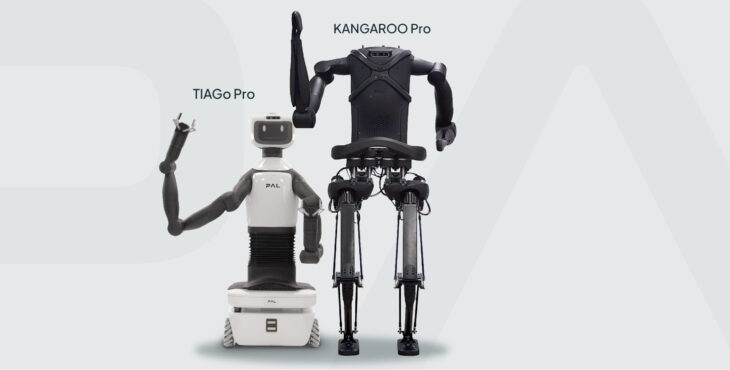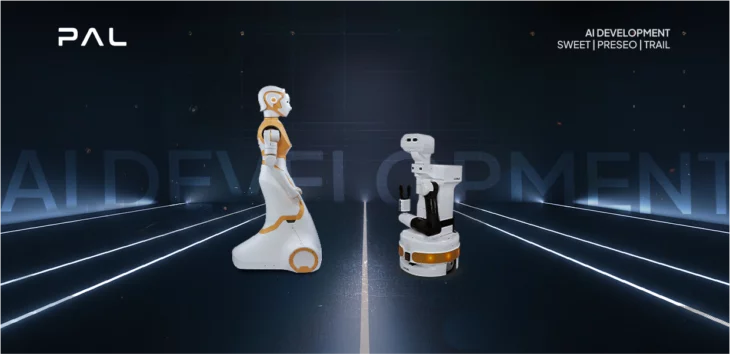The progress of social robotics with Raquel Ros
The field of social robotics has experienced significant growth in recent years. Just 10 years ago robots were mainly operating in labs, nowadays we can find them in hotel receptions, hospitals, and schools, to name just a few examples. Robots are starting to show their capabilities in a human context, and that sheds light on the challenges that the social robotics field faces as well as highlighting some of the developments needed on social robots in the coming years as they become more widely used on a daily basis. Social robotics is a key area of development, and PAL Robotics takes part in several research projects in this field.
We are very excited that social robotics professional, Raquel Ros, has recently joined the team as a Senior Scientist in Social Robotics. We had the chance to ask Raquel more about her background in the field of Human-Robot Interaction and social robotics, her research projects, and some of the challenges social robotics face, among other topics.
To read more about robotics, research, and its implications, don’t miss out PAL Robotics’ blog.
Research in the development of social robotics systems to be used by non-experts
Raquel’s research is focused on the development of social robotic systems to be used by end-users (non-experts). She has been involved in European research projects covering this topic based at institutions including the Imperial College London, and as a Marie Curie Fellow at LAAS-CNRS.
Even though Raquel has become an expert in the robotics field, she started her academic studies in IT, but AI is a topic that has always caught her attention. As she said during the interview, “In IT everything is up in the air, it doesn’t materialise, everything is based on computers. In robotics, you can see the robots in action and share a space with the robot. Furthermore, robotics helps you know people better. We need to observe, know and understand how people behave in order to reproduce it in robots.”
Her first steps in the robotics field were at IIIA-CSIC, where she did her thesis on the application of AI methods for robots that perform collaborative tasks. At this point, she discovered her passion for Human-Robot Interaction and moved to France with a Marie Curie fellowship to work on the transfer of cognitive models developed in the area of psychology in robots to improve Human-Robot Interaction at LAAS-CNRS.
After that, she moved to London, where she took part in a European project on Human-Robot Interaction with children, exploring the potential for humanoid robots to interact in either single or multiple encounters around a dance activity. That project was a breakthrough in this field, as it was one of the first projects in robotics history that a robot was set in a human context and had to demonstrate its capabilities outside of the lab through longer periods, i.e. going beyond single short-term interactions.
After 10 years in academia, Raquel’s career made a change, and she decided to move to Cambridge to leave the academic field behind and start a career in the industrial field – for two years she focused on Innovative Product Development at Cambridge Consultants.
Later, in 2017 she moved to Barcelona to go back to her passion – research on Human-Robot Interaction. Raquel started to work as a researcher and professor in robotics at La Salle University. In February 2022, Raquel joined PAL Robotics team in the HRI department, which aims to advance social robotics by making robots more relatable to people.
Projects at PAL Robotics: the co-design of socially intelligent assistive robots
Raquel is now taking part in three national projects at PAL Robotics: NHoA, RAADical, and IROPER. These projects aim to extend the independence and quality of life of older people.
The objective of NHoA is the co-design of a socially intelligent assistive robot for the home that is robust, adaptable, and fosters user acceptance. In this project, Raquel is responsible for the end-user part of the journey, where technology meets people, developing technologies with a purpose thanks to the analysis of the insights identified on our target. Furthermore, she takes part in the development of robot behaviours, interaction, validation, and the evaluation process.
The RAADical project is focused on the development of Robot Assisted Activities in Daily Care for people with some degree of dependency (e.g. older people), and feedback from the main stakeholders is key for the development of the project.
The IROPER project serves a more limited target: people with accessibility issues, in particular wheelchair users or people who are blind. As Raquel explained during the interview, “The challenge is to find out what type of solutions can be developed for people with these types of disabilities.”
Challenges in social robotics: ethical and technology-related
One of the highlights of the interview with Raquel was her vision of the challenges that social robotics would face in the coming years, “we can disseminate the challenges social robotics will face in the coming years in two branches: ethical and technology-related.”
When we asked her about the ethical aspect, she used words like privacy and security as challenges in this area. “The acceptance of robots in people’s homes is a sensitive topic. People don’t like to feel observed, so, it’s important to be careful on how we introduce this technology into the market.”
Regarding the technological features, Raquel talked about capabilities, expectations, and fiction. “Outside of the professional field, there’s a misconception of what we mean by robot and artificial intelligence. Some people base their expectations on fiction when the truth is that developing basic motions such as the capability to focus your attention on what is relevant, is already extremely complex. This knowledge gap between the professionals and the end-user brings challenges in understanding how a robot might be useful for them.”
Progress in recent years: from robots in the lab to interacting in a human context
To conclude, we asked her about the features of social robotics that have experienced the biggest development in recent years, Raquel told us “As we said before, 10 years ago robots were operating exclusively inside labs, In the recent years they have started to interact with humans, in a human context, such as schools, hospitals, hotels and so on. We could say then, that operating robots outside the lab has made more obvious the areas of advancement needed in social robotics. This is something we are working towards every day.”
We would like to thank Raquel Ros for taking the time to talk with us. You can learn more about Raquel and her previous work here. If you have any questions for Raquel or the team at PAL Robotics don’t hesitate to visit our contact page to get in touch with us.
If you are interested in human-robot interactions (HRI), read Séverin Lemaignan’s interview on human-robot relationships and their future.
To find out more about our social robots, including humanoid social robot ARI, and humanoid mobile manipulator robot TIAGo, visit PAL Robotics’ website.
- Ai
- ARI
- EU project
- HRI
- Interview
- Research
- Social robot


